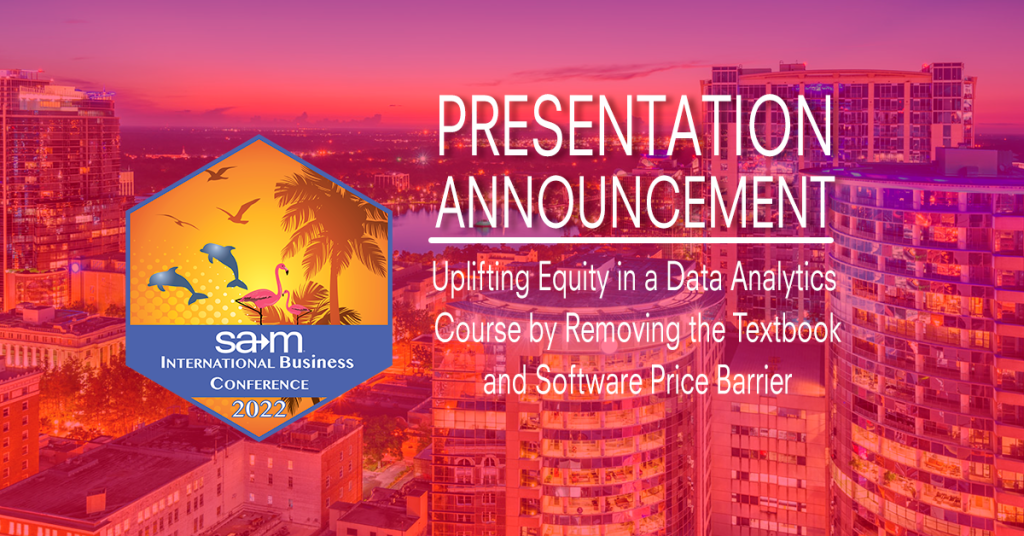
The programming committee for the 77th Annual SAM International Business Conference is pleased to announce the acceptance of the presentation Uplifting Equity in a Data Analytics Course by Removing the Textbook and Software Price Barrier, authored by Mary Lebens from Metropolitan State University.
Presentation Abstract: Over the past ten years, the cost of textbooks rose four times faster than inflation, leading 65% of students to skip buying textbooks during their college career because they could not afford them (Kristof, 2018). Students from underserved groups, such as low-income and students of color struggle with the high cost of textbooks, often delaying buying their books or foregoing them all together (Sharp, 2021; Spica & Biddix, 2021). Open Educational Resources (OER) are textbooks and other teaching materials that are freely available online for students and professors to use in their courses (DeNoyelles & Raible, 2021). OER improves equity by providing students from underserved groups with free access to their course materials (Beile et al., 2020; DeRosa, 2020). Adopting OER is proven to boost course grades, reduces failing grades, and reduce withdrawals for students who are part-time, receiving Pell grants, or who belong to groups historically underserved by higher education (Colvard et al., 2018; DeRosa, 2020). Students and faculty across a broad swath of disciplines such as psychology, history, and criminal justice perceive no difference in quality between OER and traditional textbooks (Beile et al., 2020; Bliss et al., 2013; Clinton, 2019; Cuttler, 2019; Vollman, 2021; Winitzky-Stephens & Pickavance, 2017). This study will examine the students’ perceptions of how using OER materials and freely available cloud-based software in a data analytics course impacted their success. The students who will be participating are attending a federally designated minority-serving University where 57.6% of students are low-income (Wolfston, 2020). Although the body of research on OER’s effectiveness is growing, there is little research on using OER to promote equity by eliminating the textbook cost barrier for students in data analytics courses, since the textbooks are typically bundled with the access code for the analytics software, necessitating the purchase of course materials. This descriptive case study will employ a mixed methods (quantitative and qualitative) approach to gather data by anonymously surveying analytics students. The sample is drawn from a mid-size, urban, public university in the United States, where the majority of students are people of color and 75% are Pell-grant eligible (Whelan, 2019; Wolfston, 2020). Hopefully, the larger impact and contribution of this research once it is completed is that it will encourage analytics faculty to break down textbook cost barriers for students to improve equity and student success by adopting freely available OER materials and cloud-based software.
Join us online to see this great paper and many more March 31 – April 2, 2022. For registration information visit www.samnational.org/conference.
